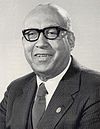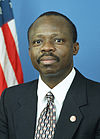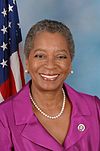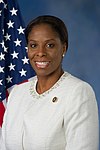
The Republican National Convention (RNC) is a series of presidential nominating conventions held every four years since 1856 by the Republican Party in the United States. They are administered by the Republican National Committee. The goal of the Republican National Convention is to officially nominate and confirm a candidate for president and vice president, adopt a comprehensive party platform and unify the party, as well as publicize and launch the fall campaign.
Non-voting members of the United States House of Representatives are representatives of their territory in the House of Representatives, who do not have a right to vote on legislation in the full House but nevertheless have floor privileges and are able to participate in certain other House functions. Non-voting members may introduce legislation. Non-voting members may vote in a House committee of which they are a member.

The 1860–61 United States House of Representatives elections were held on various dates in various states between August 6, 1860, and October 24, 1861, before or after the first session of the 37th United States Congress convened on July 4, 1861. The number of House seats initially increased to 239 when California was apportioned an extra one, but these elections were affected by the outbreak of the American Civil War and resulted in over 56 vacancies.

Elections in the U.S. Virgin Islands are held to elect senators to the Legislature of the U.S. Virgin Islands, the governor and lieutenant governor of the territory, and a delegate to the United States House of Representatives.

The Republican Party in the Virgin Islands is a political party in the U.S. Virgin Islands, and is affiliated with the Republican Party at the national level.

The Northern Mariana Islands's at-large congressional district encompasses the entire U.S. Commonwealth of the Northern Mariana Islands (CNMI). The territory does not have a voting member of Congress, but does elect a delegate who can participate in debates with the United States House of Representatives. On November 4, 2008, the first delegate was elected to the 111th United States Congress which began on January 3, 2009.

The United States House of Representatives is the lower chamber of the United States Congress, with the Senate being the upper chamber. Together, they compose the national bicameral legislature of the United States. The House is charged with the passage of federal legislation, known as bills; those that are also passed by the Senate are sent to the president for signature or veto. The House's exclusive powers include initiating all revenue bills, impeaching federal officers, and electing the president if no candidate receives a majority of votes in the Electoral College.
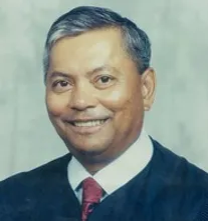
The Northern Mariana Islands' first election of a delegate to the United States House of Representatives took place on November 4, 2008. Since the CNMI traditionally had general elections in odd-numbered years, the November 2008 ballot contained only this office.
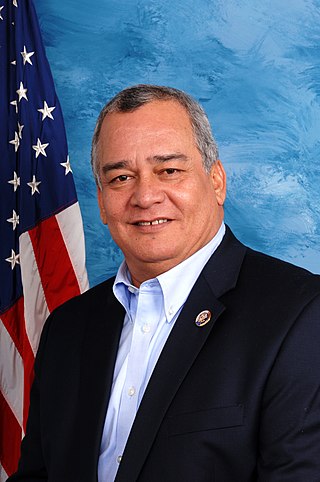
Gregorio Kilili Camacho Sablan is a Northern Mariana Islander politician and former election commissioner. Elected in 2008, Sablan became the first delegate to the United States House of Representatives from the Commonwealth of the Northern Mariana Islands. Sablan is the only Chamorro member of Congress.

The election of the president and the vice president of the United States is an indirect election in which citizens of the United States who are registered to vote in one of the fifty U.S. states or in Washington, D.C., cast ballots not directly for those offices, but instead for members of the Electoral College. These electors then cast direct votes, known as electoral votes, for president, and for vice president. The candidate who receives an absolute majority of electoral votes is then elected to that office. If no candidate receives an absolute majority of the votes for president, the House of Representatives elects the president; likewise if no one receives an absolute majority of the votes for vice president, then the Senate elects the vice president.

The 1996 United States elections were held on November 5, 1996. Democratic President Bill Clinton won re-election, while the Republicans maintained their majorities in both houses of the United States Congress.

The United States Virgin Islands general election was held on November 2, 2010. Voters chose the Governor of the United States Virgin Islands, the non-voting delegate to the U.S. House of Representatives and all fifteen seats in the Legislature of the Virgin Islands. The election coincided with the 2010 United States general election.

The 2014 United States elections were held on Tuesday, November 4, 2014, in the middle of Democratic President Barack Obama's second term. A typical six-year itch midterm election suffered by most second-term presidents, this election saw the Republican Party retaining control of the House of Representatives and winning control of the Senate, while furthering their gains in the governorships and state legislatures. Because of these Republican gains, the election was commonly cited as a "red wave" election.

The 2016 United States elections were held on Tuesday, November 8, 2016. Republican nominee Donald Trump defeated Democratic former Secretary of State Hillary Clinton in the presidential election, while Republicans retained control of Congress. This marked the first and most recent time Republicans won or held unified control of the presidency and Congress since 2004.

The 2018 United States elections were held on Tuesday, November 6, 2018. These midterm elections occurred during Incumbent Republican President Donald Trump's term. Although the Republican Party increased its majority in the Senate, unified Republican control of Congress and the White House was brought to an end when the Democratic Party won control of the House of Representatives in what was widely characterized as a "blue wave" election as Democrats also gained governorships, other statewide offices, and state legislative chambers.

Stacey Elizabeth Plaskett is an American politician and attorney serving since 2015 as the non-voting delegate to the United States House of Representatives from the United States Virgin Islands' at-large congressional district. Plaskett has practiced law in New York City, Washington, D.C., and the U.S. Virgin Islands.

The 2020 United States elections were held on Tuesday, November 3, 2020. The Democratic Party's nominee, former vice president Joe Biden, defeated incumbent Republican president Donald Trump in the presidential election. Despite losing seats in the House of Representatives, Democrats retained control of the House and gained control of the Senate. As a result, the Democrats obtained a government trifecta, the first time since the elections in 2008 that the party gained unified control of Congress and the presidency. With Trump losing his bid for re-election, he became the first president to have seen his party lose the presidency and control of both the House and the Senate since Herbert Hoover in 1932. This was the first time since 1980 that either chamber of Congress flipped partisan control in a presidential year, and the first time Democrats did so since 1948.

The 2021 United States elections were held in large part on Tuesday, November 2, 2021. This off-year election included the regular gubernatorial elections in New Jersey and Virginia. In addition, state legislative elections were held for the New Jersey Legislature and Virginia House of Delegates, along with numerous state legislative special elections, citizen initiatives, mayoral races, and a variety of other local elections. Six special elections to the United States House of Representatives also took place on November 2 or earlier as a result of either deaths or vacancies. The first of these was held on March 20.

The 2020 United States House of Representatives election in the Northern Mariana Islands was held on Tuesday, November 3, 2020, to elect the territory's Delegate to the United States House of Representatives in the 117th United States Congress. The Delegate, who is elected to a two-year term, represents the Northern Mariana Islands' at-large congressional district in the U.S. House of Representatives.

Although Guam did not participate in the 2020 presidential election because it is a U.S. territory and not a state, it still participated in the U.S. presidential primaries and caucuses. Former vice president Joe Biden won the Democratic caucus, held on June 6. The Republican caucus, held on March 14 in the form of a "state convention", endorsed incumbent President Donald Trump.


